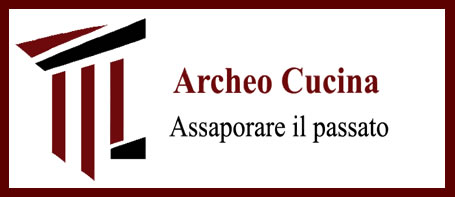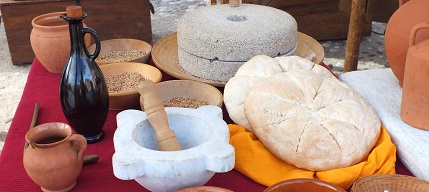Other texts and characters who speak of Roman cuisine
Pliny the Elder Pliny is an inexhaustible mine of information about foods and customs Romans, as well as that to which we need more information on the various species of vines and wines known. The book XIV of Naturalis Historia is devoted to this subject; has 22 chapters dealing with the subject in all its details, from the various species of vines, the nature of the soil, the role that plays the climate, the wine in general, the various wines of Italy and overseas known since more arrears, the enumeration of the most famous consumer of Greece and Rome. It also provides valuable information on scented plants, fruit trees, wheat, agriculture, gardening, medicinal plants, meat, fish, game, beekeeping, the bakery and vegetables
Look book XIV Latin
Catone: De Agri Cultura Lopera oldest literature agronomic Latin is the De Agri Cultura Cato. The text consists of a collection of tips on the cultivation of the fields, sullarte culinary and oenological practices and oil. Cato describes the first signs of transformation in agriculture AGRICULTURE Latin merchant; In fact, both the size of the company is the specialization of each company in a specific sector tends to widen. Thanks to his work have survived even glimpses on power legionaries and slaves; also not missing some chapters with figs, fruit dellalimentazione main Roman, and their cultivation: Ficos Marsicas locally chalky et opened engaged; Africanas et herculaneas, Sacontinas, hibernas, Tellanas atras pediculo longo, eas-site crassiore aut stercorato serted. The figs marischi plant them in clay and open places; Africans and ercolani, the saguntini, the winter, the tellani blacks to long petiole, all these plant them in soil fertilized or fat. (Cato the Censor, De Agri Cultura, 8.1)
Horace proposes a dialogue in which Fundanius, one of the two parties, told a friend that the banquet was held the previous day at the rich Nasidienus, which, while offering a canteen rich and very particular, is revealed as a host unbearable , whose sole purpose is to impress diners through linusualità abundance but most of the courses. The foods that unusual Nasidienus offers are presented in spectacular and dramatic. Each dish is accompanied by explanations unsolicited (and therefore undesirable) of the landlord, about the preparation, the origin and characteristics of the dishes. This is precisely the characteristic that annoys guests and reveals the desire dellanfitrione to show the sophistication and uniqueness of the dishes, to prove, once again, its prestige. Horace - Book I, satire VIII
Petronio Attico: Satyricon, dinner Trimalcione A moment later arrive amphorae crystal carefully sealed with labels glued to the neck that read Falernian Opimiano a hundred years. While we were busy reading, Trimalcione claps his hands shouting: "Oh God, then the wine lives longer than a poor man. But then scoliamocelo one breath! Wine is life and this is pure Opimiano. Yesterday I offered not so good, but I had to dinner people well over this matter ". While we tracanniamo and look wide-eyed all the good things, there comes a servant with a silver skeleton constructed in such a way that the joint of the vertebrae and joints allow any type of movement. After having knocked several times on the table making him take various positions thanks to the mobile structure, Trimalcione adds: "Alas, poor us, what to nothing is a poor man. We all will be well on the day that the Orc takes us. But then we live, as long as we can enjoy. "
Catullus: Carme XIII Cenabis well, I Fabulle, apud me paucis, you tibi of favent, diebus, you tecum attuleris bonam atque magnam CENAM, not sine white wine puella et et et omnibus cachinnis salt. Haec you, inquam, attuleris, Venuste Noster, cenabis well; nam tui Catulli plenus sacculus east Aranearum. Sed contra accipies meros amores, seu quid suavius elegantiusve east: nam Unguentum Dabo, quod meae puellae donarunt Veneres Cupidinesque; quod you cum olfacies, deos rogabis totum ut te faciant, Fabulle, Nasum. I invite you, my Fabullo, to a lavish dinner, in a few days, if tea allow the gods, if you are to take the big dinner and succulent, not without a splendor of girl and wine and salt and a lot of laughs. If - as I say - to you to bring all of this, I invite you, my beautiful, to a lavish dinner. Unfortunately the purse of your Catullus is full only of spider webs. In return you will have a sincere, warm reception and in addition what's more attractive and refined: the perfume that will offer them Venuses and Cupids have donated to the girl of my heart. thou, Fabullo, when you'll feel it, you will pray the gods that will transform everything in one nose
Seneca: The gods and goddesses curse a delicacy that goes beyond the boundaries of such an empire! They want to be captured over the Phases of the ingredients in their food, bother to import from volatile parts instead of importing victories. Convey every side all the foods known to the most demanding palate; is transported from the ocean, on the borders of the world, what the stomach marred by refinement leaves just enter: vomit to eat, eat to vomit, and do not give even bother to digest the food found in every corner of the earth.
(Phases) River Caucasus, considered the border between Asia and Europe. The reference is to the Seneca pheasants, phasiani, who took their name from the river Phasis.
Seneca Consolation mother Elvia

|

